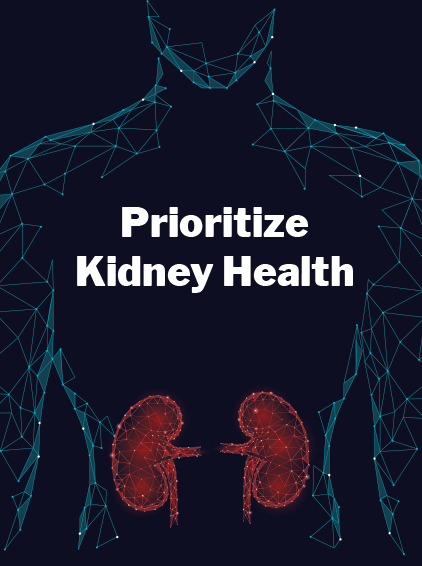Kidney Disease
What do our kidneys do? Most people are aware that a major function of the kidneys is to remove waste products, drugs, toxins, and excess fluid from the body.
The kidneys are super-efficient organs, filtering almost 200 quarts of fluid every day! This process helps maintain a stable balance of body chemicals enabling our bodies to perform their most basic functions without issue.
Our kidneys also regulate the body’s salt, potassium, and acid content, as well as produce hormones that affect the function of other organs such as stimulating red blood cell production, regulating blood pressure, and controlling calcium metabolism.
SOURCE: NATIONAL KIDNEY FOUNDATION

Warning signs for Loss of Liver Function
Because our kidneys support so many of our body’s functions, it is important to pay attention to their health. Chronic kidney disease, or chronic kidney failure, is a gradual loss of kidney function. As kidneys begin to fail, toxins build up in the body, causing many complications evidenced by some of the following symptoms:
- Nausea
- Vomiting
- Loss of appetite
- Fatigue and weakness
- Sleep problems
- Changes in how much you urinate
- Decreased mental sharpness
- Muscle twitches and cramps
- Swelling of feet and ankles
- Persistent itching
- Chest pain, if fluid builds up around the lining of the heart
- Shortness of breath, if fluid builds up in the lungs
- High blood pressure (hypertension) that’s difficult to control
Unfortunately, most of these symptoms are not specific and can be attributed to several other diseases. Additionally, the symptoms tend to come on slowly, further complicating our ability to notice them in our loved ones. Because the kidneys are highly adaptable and able to compensate for lost function, signs and symptoms may not appear until irreversible damage has occurred.

What Can Cause Kidney Disease?
There are several diseases and conditions that can contribute to the likelihood of kidney disease. If your loved one has one of these conditions, it is advisable to ask their doctor to keep an eye out for signs of kidney failure.
- Diabetes
- High blood pressure
- Smoking
- Obesity
- Heart and blood vessel (cardiovascular) disease
- Family history of kidney diseasetrol
- Being African American, Native American or Asian American

Complications from Kidney Disease
Kidney disease can affect many areas of our loved one’s lives. Some of the complications to watch for include:
- Fluid retention, which could lead to fluid in the lungs
- Cardiovascular disease
- Weak bones and an increased risk of bone fractures
- Anemia
- Difficulty concentrating, personality changes, or seizures
- Decreased immune response
SOURCE: MAYO CLINIC

Eating for Kidney Health
In addition to seeing the doctor on a regular basis, there are foods that will contribute to the health of the kidneys.
If your loved one is currently healthy, consider eating a diet that:
- Has less than 2300 mg of sodium each day
- Has smaller portions of protein
- Is heart healthy
- Consists of fresh rather than processed or prepackaged foods
- Uses more spices and herbs instead of salt
- Is grilled instead of fried
- Is lower in fat
- Includes alcohol in moderation or not at all
If your loved one already has kidney disease, they will need to eat foods that have less phosphorus and potassium. Too much phosphorus with a poorly functioning kidney can leach calcium from their bones and lead to weak and breakable bones. It can also lead to itchy skin and joint pain. Avoid foods like deli meats, bran and oatmeal cereals, dairy foods, and caramel-colored beverages. Too much potassium with a poorly functioning kidney can lead to heart disease. Avoid foods like salt or salt substitutes, canned fruits and vegetables, oranges, potatoes, brown and wild rice, beans and nuts.
SOURCE: NATIONAL INSTITUTE OF DIABETES AND DIGESTIVE AND KIDNEY DISEASES




 Call:
Call: 












